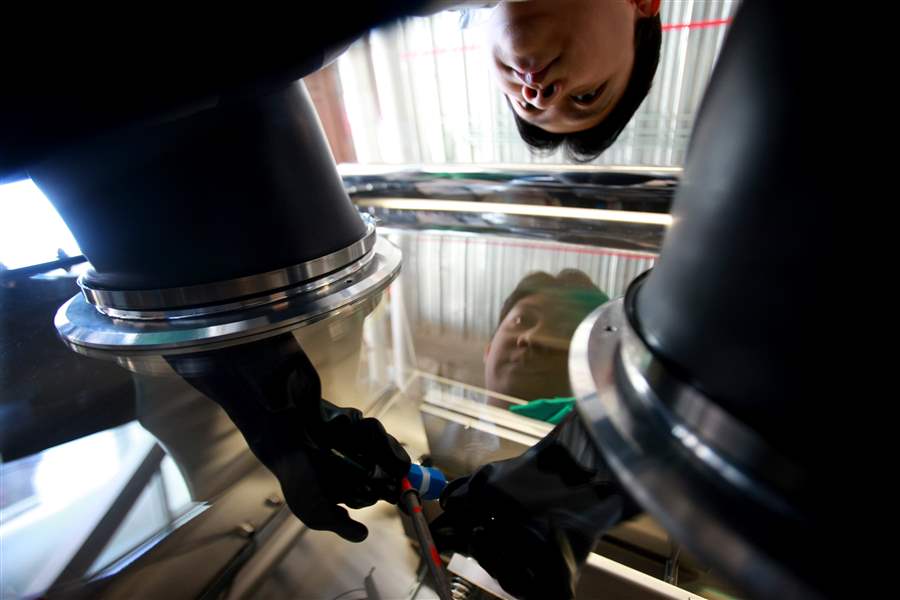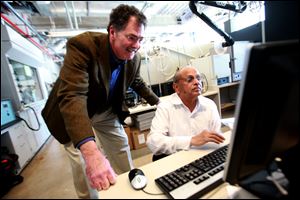
Electric vehicles, hybrids heighten need
Car makers seek engineers
4/5/2011
Graduate student Rhet De Guzman, 26, uses a voltage tester on a prototype lithium cell in an oxygen-free box at Wayne State University in Detroit. He says he can see that the auto industry is now ‘solid.'
detroit free press

Steve Salley, left, a professor at Wayne State, working with Srinivasan Venkatesan, says automotive technology is changing rapidly.

Graduate student Rhet De Guzman, 26, uses a voltage tester on a prototype lithium cell in an oxygen-free box at Wayne State University in Detroit. He says he can see that the auto industry is now ‘solid.'
DETROIT — Engineering students and newcomers to the auto industry are unfazed by the deep job cuts and troubles the industry has suffered in recent years — especially those looking to become tomorrow's electric vehicle engineers.
"Electric and hybrid vehicles are for the future — they can be for any part of the world — but also in the U.S.," said Krishna Jasti, 24, a graduate student in Wayne State University's electric vehicle drive engineering program.
Domestic automakers — on the cusp of emerging from nearly a decade of job cuts and market-share losses — are scrambling to fill thousands of engineering positions after shedding thousands over the past 10 years through job cuts and early-retirement offers.
General Motors Co., Ford Motor Co., and Chrysler Group LLC are working with colleges and universities to develop courses to train and retrain the engineers who will be expected to develop tomorrow's electric and hybrid cars and are trying to recruit from other industries.
But automakers face the challenge of recruiting people to join an old-guard manufacturing industry after years of job cuts and salaried buyouts.
"For me, it's a minor bump right now. The industry has a long, rich history," said Rhet De Guzman, 26, a graduate student at Wayne State University. "I can see that this is a solid industry."
This year, U.S. auto industry sales are expected to increase about 10 percent to 12.5 million. But that's still a far cry from the 16 million or more sold annually for most of the last decade.
"I have confidence that the auto industry will come back," said Rihong Mo, 50, who left General Electric's locomotive division in November after more than 11 years with the company to lead a team of engineers at Ford. "This is the frontier of electric motors."
That's good news for automakers, said David Cole, chairman emeritus of the Center for Automotive Research in Ann Arbor, who has been warning of a coming talent shortage in the auto industry for years.
"There are a lot of companies looking for people with certain skill sets," he said.
In most cases, the automakers are looking for engineers with hard-to-find skill sets and sometimes want years of experience. That has the companies scouring the country for talent and universities working rapidly to retool their courses to meet the demand.
The University of Detroit Mercy's college of engineering, with Ford's assistance, established a seven-course graduate certificate program in 2009 to provide additional training to Ford engineers and others.
About 150 have entered the program, and 28 received their certificates in December, the school said.
In 2009, Wayne State University and Macomb Community College received a combined $5 million grant from the U.S. Department of Energy to develop a program to retrain engineers and turn out new ones for work in an industry in transition.
"The approaches that everybody is taking may vary," said Steve Salley, associate professor of engineering at Wayne State.
"The technology is changing so rapidly, sometimes the old courses don't incorporate the new concepts."